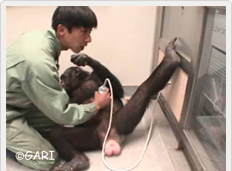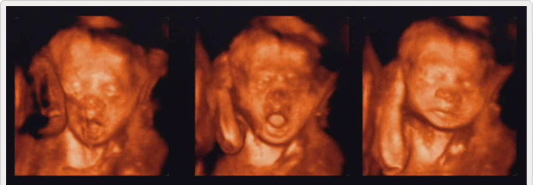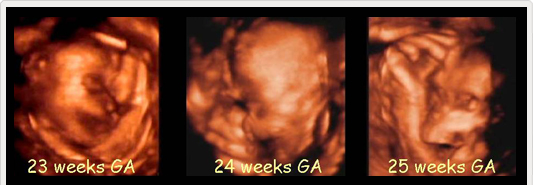Myowa-Yamakoshi Lab Menu
Recent Publications
Links
Access・Map
Graduate School of Education
Kyoto University
Yoshida-honmachi, Sakyo, Kyoto 606-8501, Japan
TEL⁄FAX +81-75-753-3074
Project
Current page
- Top Page
- Project
- Joint research with
- Dr. Satoshi Hirata(the Hayashibara Great Ape Research Center)
- Dr. Hideko Takeshita(the University of Shiga Prefecture)
Humans perceive the physical world by integrating various sensory inputs and information about our own motor system, such as forming visual images even from only touching an object. The ability to flexibly integrate information from the various senses (sight, sound, touch, etc.)and then transmit this into motor output is said to be deeply related to the human-unique intelligence, such as the ability to understand the mental state of others and the ability to use symbols, such as languages.

We are comparing the development of sensorimotor systems of humans and chimpanzees, from the fetal to infant stages. Four-dimensional(4-D)ultrasound imaging, cardiotachometry, and video cameras are used to investigate their behavioral responses to visual and audio stimuli.


- Joint research with
- Dr. Robert Shumaker and Dr. Karyl Swartz(the Great Ape Trust of Iowa)
- Dr. Satoshi Hirata(the Hayashibara Great Ape Research Center)
From two months after birth, "a fixed set of rules" can be observed in the daily communication between human infants and their primary caregivers. When a mother calls and smiles at her baby, the baby may respond in the same way; they imitate each pther by socially exchanging eye-gazing, smiling and cooing. The rules that infants discover through communication are called "social contingencies."
Many researchers have seen social contingencies as the foundation through which humans obtain awareness of themselves and others. We are performing empirical research on the recognition of social contingencies cognitive ability in chimpanzees and orangutans by using a special device connected between the vide camera and the TV monitor to insert a short temporal delay in visual information. Can they discern between delayed televised images of their current bodies or those of other individuals when the temporal discrepancy is less than 2 seconds?
Is it possible for non-human animals to possess an awareness of self that transcends the "here and now?"


- Joint research with
- Dr. Masahiko Kawai, M.D. et al.(Department of Pediatrics, Kyoto University)
The Kyoto University Hospital NICU(Masahiko Kawai, medical director)admits many newborn babies including those with extremely low birth weight in the range of 400g and those with severe health problems, and works diligently every day to provide care for them. The NICU has achieved an amazing survival rate of more than 95% for very-low-birth-weight infants.
All of the medical facility staff also hope that the infants being treated at the NICU are provided the most appropriate mental care. What sort of social environment is most appropriate for the mental development of premature infants? In the field of newborn infant medical care, 'developmental care' is growing in popularity.
Developmental care refers to efforts to protect premature infants from the stresses outside the womb, and to support their development. Infants are placed in postures similar to those in the womb environment and lightproofing and soundproofing techniques are used and protect them from sight and sound stimuli while in the NICU.
Medical staff talk to the infants when performing treatments and seek to reduce stress by providing physical contact when procedures are complete. However, one problem remains.
The scientific evidence has not offered significant proof to support these practices in places of medical care. Recent research has shown that human fetuses at mid-gestation are already developing social-cognitive skills, that their sensorimotor systems already have begun to function remarkably well, and that they can recognize their mother's voice and respond agreeably to it. It is of utmost importance to provide the appropriate environment to support the mental development of premature infants, to enable the abilities that should have developed while in the womb to be sufficiently realized outside the womb as well. In order to provide such an environment, it is necessary to provide an objective method for understanding the social-cognitive abilities of premature infants and to identify as early as possible which areas are thought to require support.
Depending on the condition of the premature infant, it may be necessary to provide support for childcare even after being discharged from the NICU, with an emphasis on long term follow-up care for development of social-cognitive abilities.
Actually, an article reviewing overseas studies in 2007 indicated that preterm infants(gestational age > 37 weeks)show less positive and more negative facial expressions and more gaze aversion than full term infants.
These findings imply that the mothers may feel stress from difficulties in communicating smoothly with their babies and in providing child care. There is great expectation for research, for which few studies exist inside or outside Japan, that aims to develop and provide support for the mental state of premature infants.